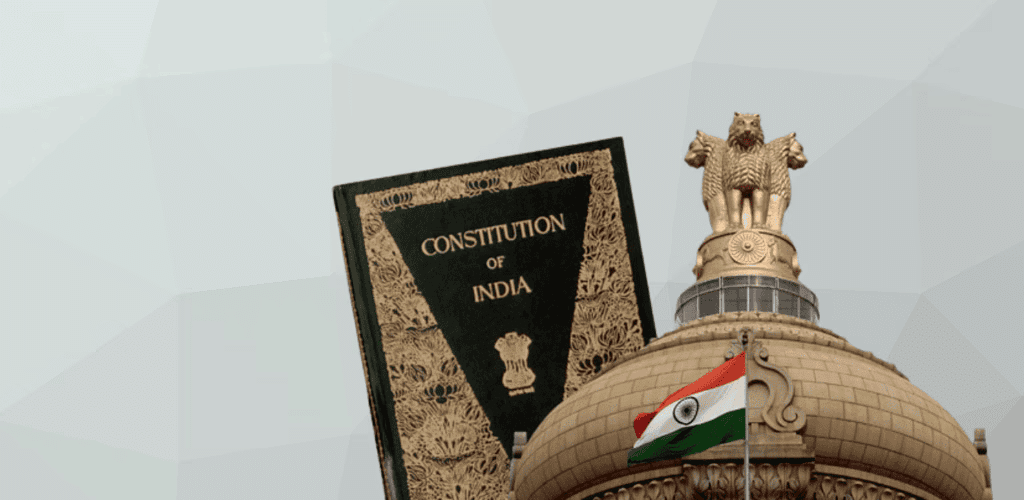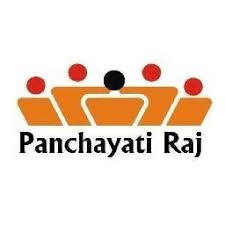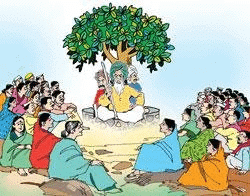NCERT Summary: The Constitution and Social Change (Class 12) | Old & New NCERTs for IAS Preparation (Must Read) - UPSC PDF Download
Introduction
Constitutional norms provide the foundation for laws and justice, ensuring fairness through the power of the state. The Constitution establishes the rules and authorities, with the Supreme Court as the ultimate interpreter. The Panchayati Raj system aims to democratize rural governance, addressing inequalities and empowering marginalized groups.
Constitutional Norms and Social Justice: Interpretation to Aid Social Justice

- It is useful to understand that there is a difference between law and justice.
- The essence of law is its force.
- Law is law because it carries the means to coerce or force obedience.
- The power of the state is behind it.
- The essence of justice is fairness. Any system of law functions through a hierarchy of authorities.
- Constitution is the basis of all rules and authorities. It is the document that constitutes a nation's tenets.
- All other laws are made as per the procedures prescribed by the Constitution. These laws are made and implemented by the authorities specified by the Constitution.
- A hierarchy of courts (which too are authorities created by the Constitution) interpret the laws when there is a dispute.
- The Supreme Court is the highest court and the ultimate interpreter of the Constitution.
The Panchayati Raj and the Challenges of Rural Social Transformation
The Ideals of Panchayati Raj

- The objective is to establish a robust and functional democracy at the grassroots or village level. Although grassroots democracy is not a new idea in India, unequal participation in democratic activities based on gender, caste, and class is prevalent in a society marked by stark inequalities.
- During the constitution drafting process, panchayats were not explicitly mentioned, which disappointed and angered some members.
- Dr Ambedkar argued that local self-government would only perpetuate the exploitation of the oppressed masses of Indian society, given the entrenched nature of upper castes and local elites in society, drawing on his own rural upbringing.
- Gandhiji, on the other hand, had a particular affinity for the concept of local governance. In his vision, the ideal model for post-independence India was gram-swarajya, where each village would be an autonomous entity managing its own affairs.
- It wasn't until the 73rd Constitutional Amendment in 1992 that grassroots democracy or decentralized governance was introduced, and the Panchayati Raj Institutions (PRIs) were granted constitutional status. Local self-governing bodies in rural and urban areas are now required to hold elections every five years.
- Under the 73rd and 74th amendments to the Constitution, one-third of all elected positions in local bodies in both rural and urban areas are reserved for women. Seventeen percent of these seats are reserved for women from scheduled castes and tribes.
- This amendment is significant because it grants women the right to vote and decision-making power for the first time. Women are only allowed to hold one-third of the seats in gram panchayats, village panchayats, municipalities, city corporations, and district boards.
Powers and Responsibilities of Panchayats

The main responsibilities of Panchayats are to:
- Develop plans and strategies for economic growth.
- Collect taxes, duties and other revenues in the village.
- Promote social justice programs and initiatives.
- Help in transferring governmental responsibilities, especially those related to finance, to local authorities.
To be socially responsive, Panchayats must ensure the registration of births, deaths and burial grounds, promote cattle facilities, and provide family planning and child care services. Economic development activities include constructing roads, buildings, wells, tanks, ponds, schools, colleges, small-scale industries, and irrigation systems. Panchayats use the revenue collected from taxes and duties for the betterment of the village.
- To ensure social justice, Panchayats must protect women, provide support to the Scheduled Castes and Tribes, and follow the government's recommendations.
- In some states, Nyaya Panchayats have been established to hear minor civil, criminal, and administrative disputes. They can impose fines but not sentences. These village courts have been successful in mediating settlements between disputing parties.
Panchayati Raj in Tribal Areas
- Grassroots democracy has a rich history in many tribal areas. The three major ethnic tribal groups, the Khasis, Jaintias, and Garos, have well-established political structures that operate at various levels, including the village, clan, and state levels.
- However, sociologist Tiplut Nongbri notes that tribal institutions are not inherently democratic in their structure and operation, despite the strong egalitarian ethos of tribal societies. This is due to some degree of stratification within these societies, as well as intolerance towards women.
- Social changes have also led to significant distortions in tribal political institutions, making it difficult to distinguish between those that are traditional and those that are not.
Democratization and Inequality
- In a society with a long history of caste, community, and gender inequality, democratisation is not simple.
- It is not surprising that in many instances, members of specific groups, communities, or castes of the village are not included or informed about meetings and activities of the village given this unequal and undemocratic social structure.
Political Parties, Pressure and Interest Groups in Democratic Politics
Different groups seek to make their voices heard and draw the attention of the government to their grievances. For example, industrialists form associations such as FICCI and ASSOCHAM, while workers form trade unions like INTUC and CITU.
Farmers organize into agricultural unions such as Shetkari Sangathan, and agricultural laborers have their own unions. Other social movements include tribal and environmental movements.
In a democratic government, political parties are key actors. A political party is defined as an organization oriented towards achieving legitimate control of government through an electoral process.
These parties aim to achieve governmental power and pursue specific programs, based on their understanding of society and how it ought to be.
In a democratic system, the interests of different groups are represented by political parties, which take up their cases.
Different interest groups work towards influencing political parties. When certain groups feel their interests are not being addressed, they may form alternative parties or pressure groups to lobby the government. Interest groups are organized to pursue specific interests in the political arena, primarily by lobbying legislative bodies.
Political organizations seeking power but denied the opportunity through standard means are regarded as movements until they achieve recognition.
Conclusion
The integration of constitutional norms with social justice underscores the law's role in achieving fairness. The 73rd and 74th amendments have advanced grassroots democracy, promoting equity and development. Continuous interpretation of the Constitution is essential for fostering an inclusive and just society.
|
3 videos|705 docs|515 tests
|
FAQs on NCERT Summary: The Constitution and Social Change (Class 12) - Old & New NCERTs for IAS Preparation (Must Read) - UPSC
| 1. What are the constitutional norms that support social justice in India? |  |
| 2. How does the Panchayati Raj system contribute to rural social transformation? |  |
| 3. What challenges does the Panchayati Raj face in tribal areas? |  |
| 4. How do political parties and interest groups influence democratic politics in India? |  |
| 5. What role does the Constitution play in facilitating social change in India? |  |





















